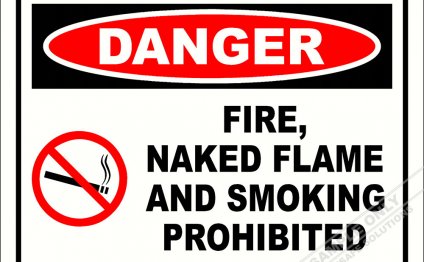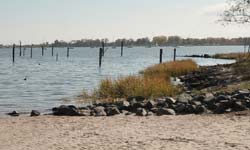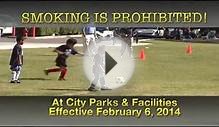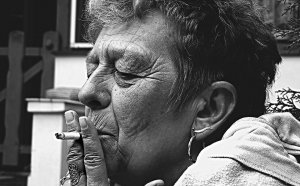
Smoking prohibited
 To improve the beauty of the city's public outdoor spaces, and ensure an even healthier and cleaner experience for New Yorkers, smoking is prohibited within New York City's parks, beaches and pedestrian plazas.
To improve the beauty of the city's public outdoor spaces, and ensure an even healthier and cleaner experience for New Yorkers, smoking is prohibited within New York City's parks, beaches and pedestrian plazas.
Public Spaces Covered by the Smoking Ban
Smoking is prohibited in the following areas:
- All New York City parks except median strips
- Beaches and boardwalks
- Public golf courses
- Sports stadia grounds
- Smoking continues to be prohibited in playgrounds, pools and inside stadia
Permitted Areas
Smoking is allowed on sidewalks outside parks, including sidewalks that form the perimeter of parks. For example, smoking will be allowed on the sidewalk on 5th Avenue outside Central Park. Smoking is permitted in the parking lots of all Parks properties.
Even though medians in the middle of large streets such as Broadway are under the jurisdiction of Parks, they are mainly used to cross the street so smoking by pedestrians would be permitted to continue in these areas.
Electronic Cigarettes
As of April 29, 2014, The City Council approved legislation to include electronic cigarettes (e-cigarettes) in the Smoke-Free Air Act. No one is allowed to use an e-cigarette in places where smoking is prohibited, including parks and beaches.
Enforcement
The new law will be enforced mostly by New Yorkers themselves. We expect that New Yorkers will ask people to follow the law and stop smoking. This is how similar laws have worked in other places, including Chicago and Los Angeles. However, people who violate the new law could receive a $50 ticket.
If someone refuses to stop smoking in a park, beach or other area where smoking is prohibited, New Yorkers are encouraged to inform a Parks Department employee or a Park Enforcement Officer if one is available. Otherwise, complaints can be made by calling 311.
Anyone who receives a ticket for violating park rules is entitled to challenge the ticket in court.
Health Impact
Studies suggest that sitting 3 feet away from a smoker outdoors can expose you to the same level of secondhand smoke as if you were sitting indoors with a smoker. Secondhand smoke can trigger asthma attacks, increase the risk of blood clots and hurt blood vessels. The new law will reduce people's exposure to secondhand smoke outdoors.
New Yorkers are exposed to secondhand smoke at higher rates than the national average In fact, 57% of New Yorkers who do not smoke have elevated levels of cotinine in their blood compared to 45% of non-smokers nationally. Cotinine is residue left by exposure to secondhand smoke. Non-smokers in New York City have more cotinine in their bodies even though we have strong indoor smoking laws. There is no known safe level of exposure to secondhand smoke, and smoke-free parks and beaches will help to eliminate a source of secondhand smoke.
VIDEO REVIEWS



Share this Post
Related posts
Tobacco history facts
Nicotine was isolated from tobacco leaves ( Nicotiana tabacum ) in 1828, but the powerful effects of nicotine were already…
Read MoreHistory of tobacco Regulation
National Commission on Marihuana and Drug Abuse THE BAN ON ADVERTISING Both the U.S. Public Health Service and Federal Trade…
Read More










